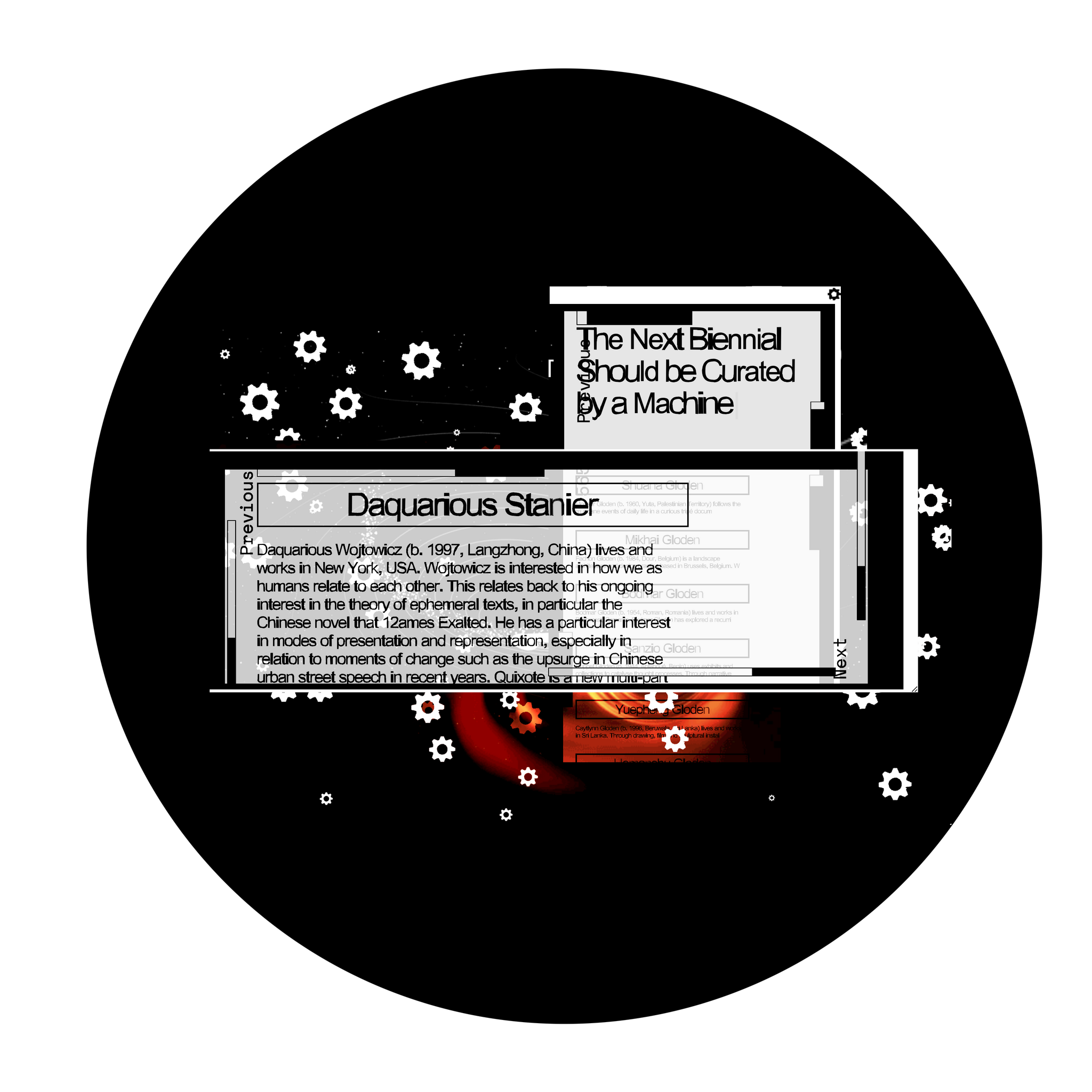UBERMORGEN, Leonardo Impett, Joasia Krysa: The Next Biennial Should Be Curated by a Machine
2021
UBERMORGEN, Leonardo Impett, Joasia Krysa: The Next Biennial Should Be Curated by a Machine
The Next Biennial Should Be Curated by a Machine reimagines the future of curating in the light of Artificial Intelligence as a self-learning human-machine system. Developed as a collaboration between artists UBERMORGEN, digital humanist Leonardo Impett, and curator Joasia Krysa, this project features a group of technical machine learning processes collectively named B3(NSCAM).
The B3(NSCAM) software uses datasets from Liverpool Biennial and the Whitney Museum, among other sources. It processes them linguistically and semiotically, calculating a future probability for words to appear, to generate endless combinations of possible instances of Biennials in flux. These imagined occurrences manifest as texts—seemingly conventional artist biographies, curatorial statements, press releases, and art magazine reviews—which engage in a continuous process of rewriting themselves. Always remaining fluid and ungraspable, the texts are presented in windows on a range of animated visual backgrounds that allude to the sixty-four parallel universes of possible Biennials constructed by the AI.
Clicking on the interface's spinning wheels will launch a new Biennial universe on an animated graphic constructed from sources such as NASA and sci-fi imagery. Each universe is accompanied by a soundtrack from the TikTok playlist, alluding to the mix of creative expression and preconfigured elements in digital tools. The respective universes are created by subtle changes in the software's parameters, for example giving more weight to one data set—such as the Whitney or Liverpool Biennial—over another, or simply generating variations of biographies for artists with the same first or last name. Together these textual and graphic universes of Biennials narrate and visualize the impossible, absurd endeavor of an AI to curate on the basis of what it has learned from sources compiled by people and human understandings of art.
This project includes a background with a flashing graphic effect.
The Next Biennial Should Be Curated by a Machine is commissioned by Liverpool Biennial and the Whitney Museum of American Art, with support from Liverpool John Moores University, Pro Helvetia, Federal Chancellery of Austria, and the City of Vienna. The project is accessible through the websites of Liverpool Biennial and the Whitney Museum of American Art's online platform artport.
UBERMORGEN is an artist duo founded in 1995. Autistic actionist lizvlx and pragmatic visionary Hans Bernhard are net.art pioneers and media hackers widely recognized for their high-risk research into data and matter, haute couture websites and polarizing social experiments. CNN called them "Maverick Austrian Business People" during their Vote-Auction online project. They reached a global audience of 500 million while challenging the FBI, CIA, and NSA during the U.S. presidential election. In 2005, they launched their acclaimed EKMRZ Trilogy, a series of conceptual hacks: Google Will Eat Itself, Amazon Noir, and The Sound of eBay. UBERMORGEN occupies 175 domains. Their exhibition history includes the New Museum, New York; Somerset House, London; Haifa Museum of Art, Israel/Palestine (2019); Wei-Ling Contemporary, Kuala Lumpur, Malaysia; HKW, Berlin; ZKM, Karlsruhe, Germany; National Art Gallery, Bulgaria (2017); ICA Miami, USA; Mahatma Gandhi Institute, Mauritius (2015); Serpentine Galleries, London (2014); Kunsthal Aarhus, Denmark; Ars Electronica, Austria; MoMA Ljubljana, Slovenia; ArtScience Museum, Singapore (2013); 3331 Arts Chiyoda, Japan (2012); Centre Pompidou, Paris; Gwangju Design Biennale, Korea; WRO Media Art Biennale, Wrocław, Poland (2011); Prague Biennale, Czech Republic (2009); Biennale of Sydney, Australia (2008); MOCA Taipei (2007); The Premises, Johannesburg, South Africa; ICC Tokyo, Japan (2005); SFMOMA, USA (2001).
Leonardo Impett is a digital humanist working at the intersection of computer vision and art history. In trying to bring "distant reading" to visual studies, his current research focuses on unveiling the implicit image-theories of computer vision and constructing new computer vision systems based on early modern philosophies of vision. He is assistant professor of computer science at Durham University, and was previously a digital humanities scientist at the Max Planck Institute for Art History, Rome; a digital humanities fellow at the Harvard University Center for Italian Renaissance Studies; a member of the Image and Visual Representation Laboratory at EPFL; a visiting fellow at Cambridge University Digital Humanities; and an associate researcher at the Orpheus Institute for Artistic Research in Music, Ghent.
Joasia Krysa is a curator, professor of exhibition research, and head of art and design at Liverpool John Moores University, in partnership with Liverpool Biennial. Her first curatorial software experiment was launched at Tate Modern in 2005 and published in Curating Immateriality (2006). She has curated at the intersection of art and technology, amongst others as part of the curatorial team of Documenta 13, co-curator of Liverpool Biennial 2016; and artistic director of Kunsthal Aarhus, Denmark. She currently serves as a curatorial advisor for Sapporo International Art Triennale SIAF 2020 in Japan and Helsinki Biennale 2021.
artport
View more on artport, the Whitney Museum's portal to Internet and new media art.

